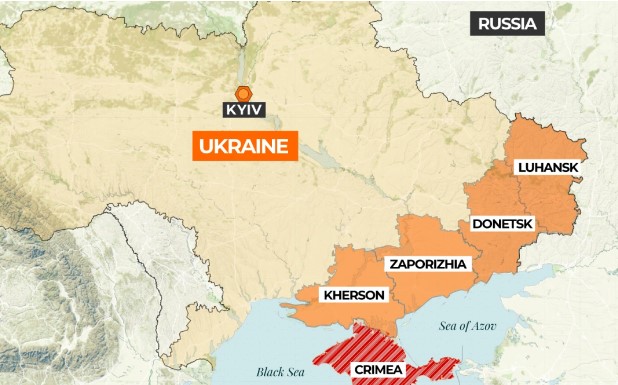Virendra Pandit
New Delhi: Although he is skipping the two-day G-20 Summit in New Delhi, beginning on Saturday—he will not even address it virtually!—Russian President Vladimir Putin is all set to showcase his ‘democratic’ side—to get votes for his candidates at gun-point in the occupied areas of Ukraine where Moscow is waging a relentless, but losing, war since February 24, 2022.
To tighten its grip on annexed areas, Russia is holding local elections in occupied Ukrainian regions from Friday to Sunday this weekend.
The voting for Russian-installed ‘legislatures’ in the Donetsk, Luhansk, Kherson, and Zaporizhzhia regions began on Friday. It has already been denounced by Kyiv and the West, the media reported.
Russian officials are holding local elections in the occupied parts of Ukraine to tighten their grip on territories Moscow annexed a year ago and still does not fully control because of stiff opposition by the Ukrainians.
“It constitutes a flagrant violation of international law, which Russia continues to disregard,” the Council of Europe, the continent’s foremost human rights body, said this week.
Ukraine’s parliament said the balloting in areas where Russia “conducts active hostilities” poses a threat to Ukrainian lives. Lawmakers urged other countries not to recognize the results of the sham vote.
For Russia, however, it is important to keep up the illusion of normalcy, despite the Kremlin having little control over the annexed regions, the reports said.
Voters are supposed to elect regional legislatures, which in turn will appoint regional governors. In the Donetsk and Luhansk provinces, thousands of candidates are also competing for seats on dozens of local councils.
The main contender in the election is United Russia, the Putin-loyal party that dominates Russian politics, although other parties, such as the Communist Party or the nationalist Liberal Democratic Party, are also in the race.
For some residents of the Donetsk and Luhansk regions, large swaths of which have been held by Russian-backed separatists since 2014, there is nothing unusual about the vote.
In Kherson and Zaporizhzhia, local residents and Ukrainian activists say poll workers make house calls, accompanied by armed soldiers, and most voters know little about the candidates, up to half of whom reportedly came from Russia — including remote regions in Siberia and the Far East.
But “locals understand that these elections don’t influence anything” and “are held for Russian propaganda purposes,” a Ukrainian said, comparing this year’s vote to the referendums Moscow staged last year in the four partially occupied regions.
Those referendums were designed to put a veneer of democracy on the annexation. Ukraine and the West denounced them as a sham and decried the annexation as illegal.
Weeks after the referendum, Russian troops withdrew from the city of Kherson, the capital of the Kherson region, and areas around it, ceding them back to Ukraine. As a result, Moscow has maintained control of about 70 percent of the Kherson region.
Three other regions are also only partially occupied, and Kyiv’s forces have managed to regain more land — albeit slowly and in small chunks — during their summer counteroffensive.
In the occupied part of the Zaporizhzhia region, where the counteroffensive efforts are focused, Moscow-installed officials declared a holiday for Friday, the first day of voting.
The Russian-appointed governor of the annexed region, Yevgeny Balitsky, noted in a recent statement that 13 front-line cities and villages in the region come under regular shelling, but he expressed hope that despite the difficulties, the United Russia party “will get the result it deserves.”
The city’s population of 60,000 — down from 149,000 before the war — has been subject to enhanced security in the days leading up to the election. Authorities stop people in the streets to check their identification documents and detain anyone who looks suspicious, he said.
But a Ukrainian said it all: “People are intimidated and scared because everyone understands that an election in an occupied city is like voting in prison.”
Russians aim to have up to 80 percent of the population take part in the early voting, according to the Eastern Human Rights Group, a Ukrainian rights group that monitors the vote in the occupied territories.
Poll workers go door to door — to markets, grocery stores, and other public places — to get people to cast ballots. Both those who have gotten Russian citizenship and those still holding Ukrainian passports are allowed to vote.
Those who refuse to vote are being detained for three or four hours, the group’s coordinator, Pavlo Lysianskyi, said. Officials make them “write an explanatory statement, which later becomes grounds for a criminal case against the person.”
Lysianskyi’s group has counted at least 104 cases of Ukrainians being detained in occupied regions for refusing to take part in the vote.

